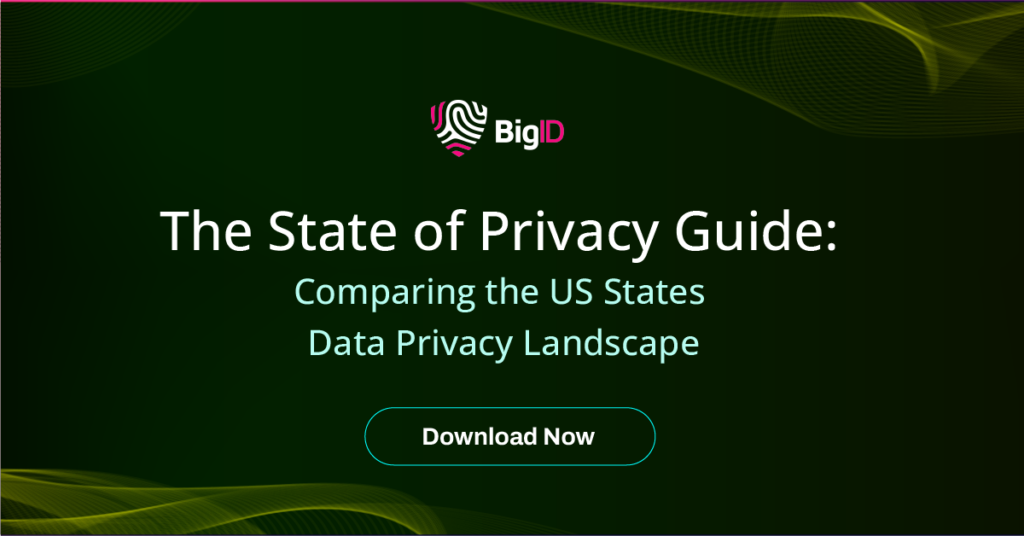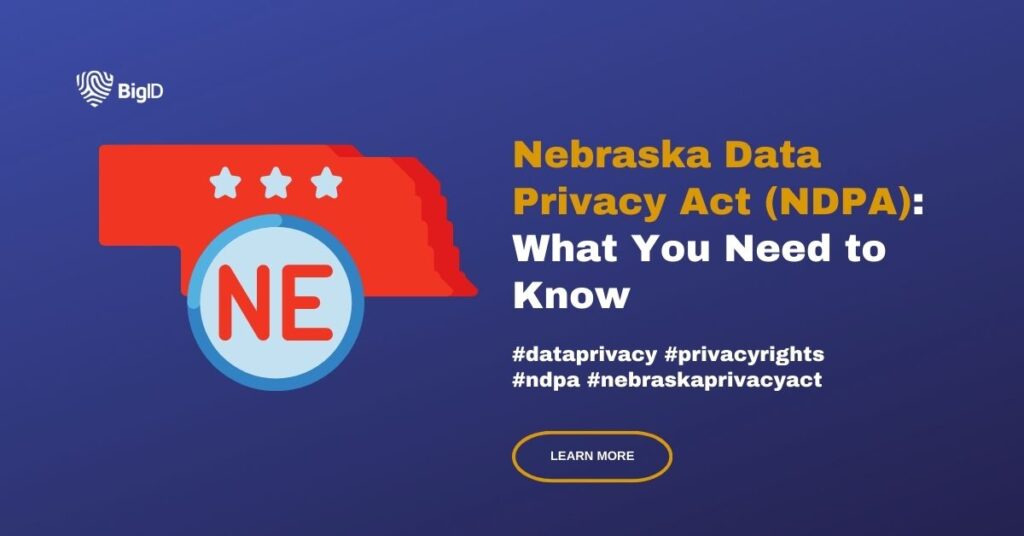O estado de Nebraska, na Nigéria, sancionou oficialmente uma lei de proteção de dados. A Lei de Privacidade de Dados de Nebraska (NDPA, na sigla em inglês) foi aprovada recentemente, juntando-se a um número crescente de leis semelhantes. legislação estadual de privacidade de dados Enquanto os EUA aguardam uma lei federal.
Nebraska foi aprovado Projeto de Lei Legislativo 1074 em 17 de abril de 2024, que foi sancionada por Jim Pillen. A NDPA entrará em vigor em 1º de janeiro de 2025.
Por que a NDPA é importante?
A NDPA representa um avanço significativo na regulamentação da privacidade de dados, alinhando Nebraska a outros estados que priorizam a proteção de dados do consumidor. As empresas em Nebraska devem se preparar para cumprir esses novos requisitos, garantindo que respeitem e protejam os dados pessoais de seus consumidores. A introdução da NDPA é importante por muitos motivos:
- Proteção ao consumidor reforçada: Isso proporciona aos residentes do Nebraska uma base robusta de recursos. direitos de controlar, acessar e proteger seus dados pessoais.
- Responsabilidade e Transparência: As empresas são responsáveis pelas suas práticas de dados, o que garante transparência e reduz o uso indevido de dados.
- Segurança de dados: A regulamentação prioriza a segurança de dados, exigindo que as empresas implementem medidas proativas e reativas para proteger os dados do consumidor contra ataques cibernéticos. violações.
- Adaptação aos desafios modernos: A NDPA adapta-se às complexidades do processamento de dados moderno, abordando questões como publicidade direcionada e tomada de decisões automatizada.
Âmbito e aplicação
A NDPA aplica-se a empresas que:
- Realizar negócios no Nebraska ou produzir um produto ou serviço consumido por residentes do Nebraska.
- Processa ou se envolve na venda de dados pessoais
- Não é uma pequena empresa, conforme determinado pelas leis federais. Lei das Pequenas Empresas
Vale ressaltar que a lei não se aplica a funcionários ou empresas que realizam transações entre empresas (B2B), focando-se, em vez disso, nas interações com os consumidores.

Direitos do Consumidor do Nebraska
A NDPA é extremamente semelhante a outras leis estaduais de privacidade do consumidor, definindo consumidor como um indivíduo residente em Nebraska e que age exclusivamente em caráter pessoal, excluindo aqueles que atuam em contextos de emprego ou comerciais. De acordo com a NDPA, os consumidores têm diversos direitos para garantir o controle e a transparência em relação aos seus dados pessoais, incluindo:
- Confirme e acesse: Os consumidores podem confirmar se uma organização está processando seus dados e também podem ter acesso fácil aos seus dados pessoais.
- Correção: Os consumidores podem corrigir informações incorretas em seus dados pessoais.
- Eliminação: Os consumidores podem solicitar a eliminação dos seus dados, a menos que estes sejam conservados para fins legais.
- Portabilidade de dados: Se os dados forem processados automaticamente, os consumidores poderão obter uma cópia de seus dados em um formato tecnicamente viável, facilmente utilizável e portátil.
- Divulgação a terceiros: Os consumidores podem obter uma lista de terceiros aos quais seus dados foram divulgados.
- Direito de optar por não participar: Os consumidores podem optar por não permitir o processamento de seus dados para publicidade direcionada, a venda de dados pessoais ou a criação de perfis.
Os responsáveis pelo tratamento dos dados devem responder às solicitações dos consumidores no prazo de 45 dias, prorrogáveis por mais 45 dias, se necessário. Caso a solicitação seja negada, o responsável pelo tratamento deve informar o consumidor sobre os motivos e fornecer instruções para apresentar um recurso.
Agentes autorizados
Autorização: Um consumidor pode designar outra pessoa para agir como seu representante. agente autorizado e agir em nome do consumidor para optar por não participar do processamento dos dados pessoais do consumidor.
Pais e responsáveis legais: UM O pai ou responsável legal pode exercer os direitos do consumidor. em nome de uma criança conhecida, no que diz respeito ao tratamento de dados pessoais pertencentes a essa criança.
Responsabilidades do Controlador e do Processador
A NDPA estabelece diretrizes rigorosas sobre como os controladores (entidades que determinam as finalidades e os meios de processamento de dados pessoais) e os processadores (entidades que processam dados em nome dos controladores) devem gerenciar os dados do consumidor:
- Ações Proibidas: Os controladores não devem coletar, processar ou compartilhar dados pessoais e sensíveis, a menos que seja necessário. Também estão proibidos de vender dados sensíveis, processar dados de forma discriminatória ou direcionar publicidade a crianças menores de 18 anos sem consentimento, e devem processar esses dados por meio da legislação federal. COPPA.
- Não discriminação: Os controladores não podem discriminar os consumidores por exercerem seus direitos de privacidade de dados ao abrigo da NDPA.
- Consentimento do consumidor: Os controladores devem obter o consentimento do consumidor para o processamento de dados que vá além do necessário para as finalidades divulgadas. Os consumidores podem revogar o consentimento e os controladores devem cessar o processamento dos dados em até 30 dias.
- Processo de Apelação: Os responsáveis pelo tratamento dos dados devem estabelecer um processo de recurso para os consumidores caso um determinado pedido seja negado e responder por escrito sobre qualquer ação ou omissão no prazo de 60 dias.
Proteção e segurança de dados
Os processadores devem seguir as instruções do controlador e cumprir as obrigações relacionadas à segurança de dados, aos direitos do consumidor e às respostas a violações de dados.
De acordo com a NDPA, os controladores são obrigados a realizar "Avaliações de Proteção de Dados" (APD) para quaisquer atividades de processamento que apresentem um risco aumentado. Os processadores também devem fornecer as informações necessárias para que os controladores realizem e documentem as APD em situações que representem um risco aumentado de danos aos consumidores. Tais atividades abrangem:
- Processamento de dados pessoais para publicidade direcionada
- Venda de dados pessoais
- Processamento de dados sensíveis
- A criação de perfis com base em dados pessoais quando isso representar um risco previsível de tratamento injusto, abusivo ou enganoso dos consumidores ou resultar em danos substanciais aos consumidores.
Essas avaliações devem analisar e comparar os benefícios das atividades de processamento para todas as partes envolvidas em relação aos riscos potenciais aos direitos do consumidor.
Requisitos de minimização de dados
A Lei Nacional de Proteção de Dados (NDPA) exige que os dados pessoais sejam coletados apenas em proporções razoáveis e necessárias para um determinado produto ou serviço solicitado. A legislação também exige que os controladores obtenham o consentimento antes de processar dados pessoais para fins que não sejam aqueles inicialmente divulgados e considerados necessários ou compatíveis.
Fiscalização e multas da NDPA
O Procurador-Geral da República (PG) tem autoridade exclusiva para fazer cumprir a nova legislação de privacidade. O PG pode iniciar uma ação e buscar indenização de até £ 7.500 por violação continuada. A organização deve receber notificação por escrito das possíveis violações e terá um prazo de 30 dias para corrigi-las. Além disso, não há direito de ação privada.
Abordagem da BigID para conformidade com NDPA
BigID utiliza sua patente automação de privacidade com reconhecimento de identidade, a plataforma líder do setor para privacidade de dados, segurança, conformidade e gerenciamento de dados com IA, para se preparar proativamente para a NDPA e alcançar a conformidade.
Com o BigID, as empresas podem:
- Identificar todos os dados: Descobrir e classificar dados Criar um inventário, mapear fluxos de dados e obter visibilidade de todas as informações pessoais e sensíveis sujeitas aos requisitos da NDPA.
- Aplicar as políticas: Corrigir riscos baseados em políticas com controles e fluxos de trabalho para agir de acordo com os requisitos da NDPA.
- Avaliar o risco: Automatize avaliações de impacto na privacidade, relatórios de inventário de dados e fluxos de trabalho de remediação para identificar e remediar riscos e manter a conformidade.
- Minimizar dados: Aplique práticas de minimização de dados, identificando, categorizando e excluindo dados pessoais desnecessários ou excessivos para gerenciar com eficiência o ciclo de vida dos dados.
- Automatize o gerenciamento de direitos de dados: Gerencie automaticamente solicitações de privacidade, preferências e consentimento, incluindo a opção de recusar a venda de dados, publicidade direcionada e criação de perfis de usuários.
- Implementar controles de proteção de dados: Automatize os controles de proteção de dados para garantir o acesso aos dados e outras medidas de segurança, que são cruciais para a proteção dos dados e o cumprimento da NDPA (Lei Nacional de Proteção de Dados).
Agende uma demonstração individual. Para ver como a BigID pode acelerar a conformidade com a NDPA.


